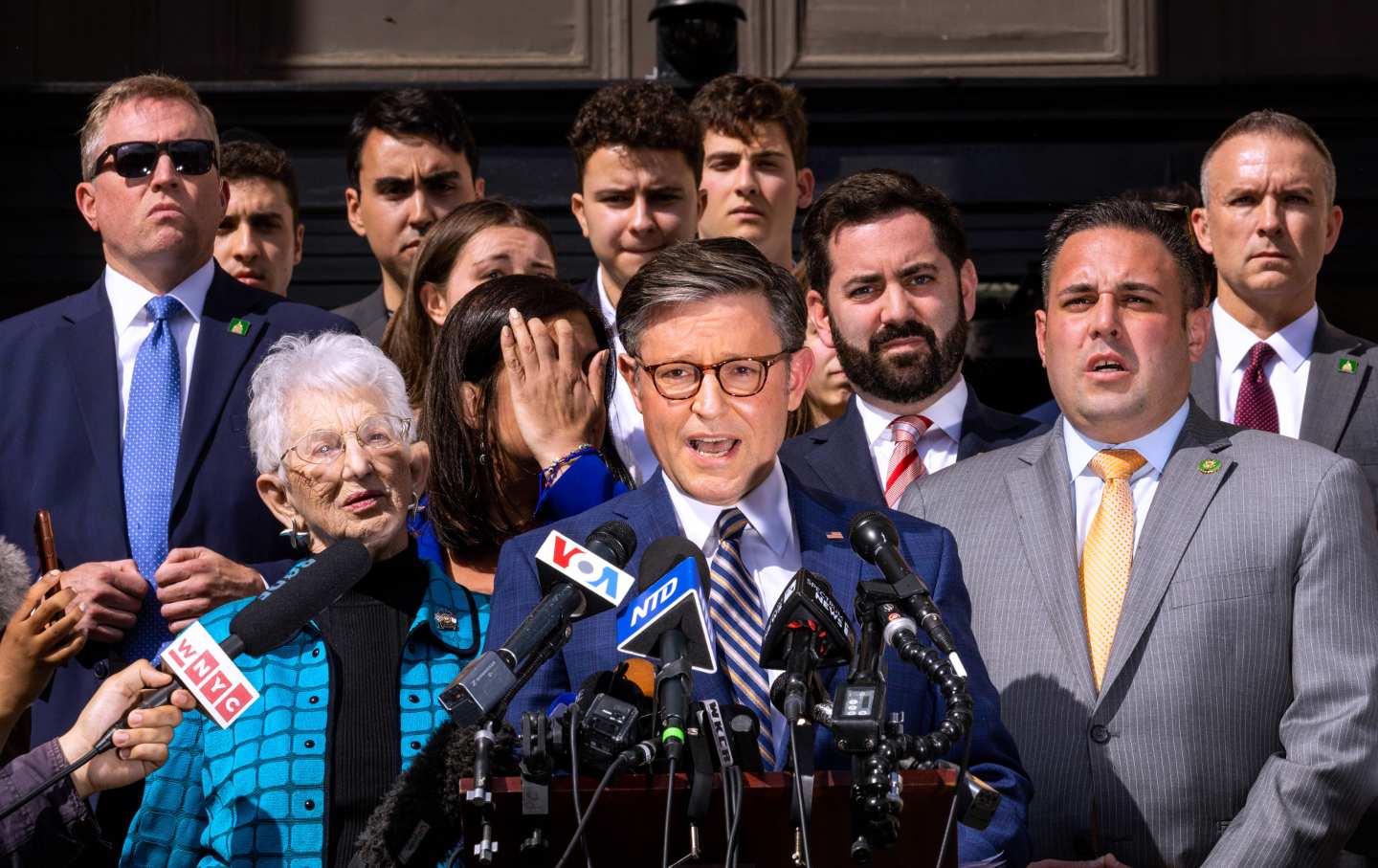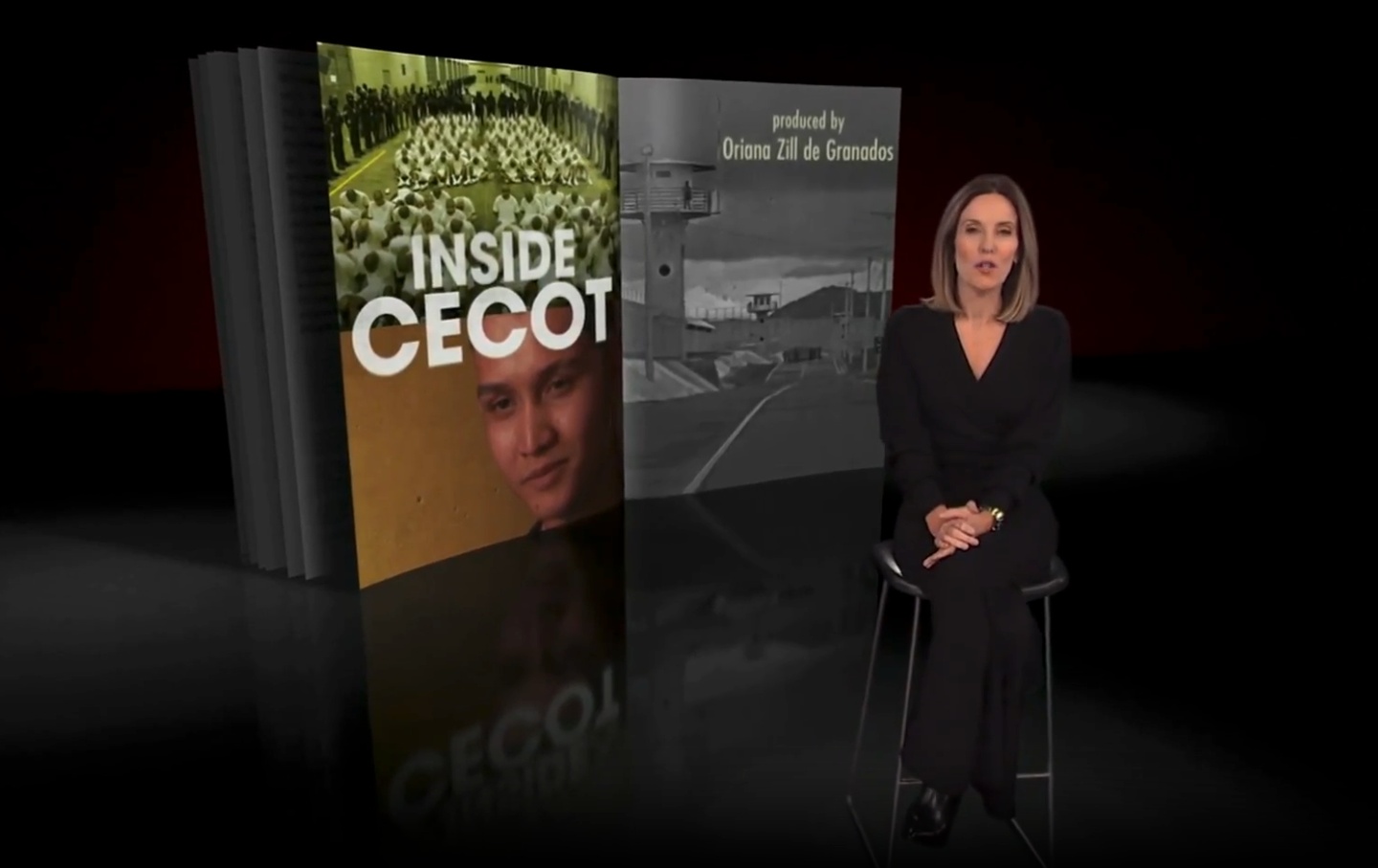The Attacks on the Palestine Movement Are Getting Stupider by the Second
The enemies of the movement have always been bigots and liars. But we’re reaching an even more hysterical state. What’s going on?

Speaker of the House Mike Johnson (R-LA) speaks during a press conference at Columbia University on April 24, 2024.
(Alex Kent / Getty Images)I would never say I expected more from Arkansas Republican Senator Tom Cotton, as that would have required me to expect anything good from him. But I still found myself surprised when he referred to the Columbia University protests against Israel’s war on Gaza as a form of “pogroms.”
Nor did I expect more from The Wall Street Journal, which ran an op-ed arguing that Hamas and Hezbollah are “working with and grooming” pro-Palestine activists. Nor from Benjamin Netanyahu, who compared the campus protests to Nazi Germany. Nor from House Speaker Mike Johnson or Anti-Defamation League President Jonathan Greenblatt, both of whom called for the National Guard to be sent to Columbia.
Yet I have been consistently taken aback at just how ridiculous these and other claims from the media and politicians about the growing pro-Palestine movement have become recently.
Politicians and the mainstream media outlets that support them are consistently simplistic in their analyses, or flat-out wrong, or, well, stupid. But over the last few weeks, it feels like the stupidity has ramped up to a level previously unreached—a level that can no longer be described as misinterpretation or obfuscation or spin, but rather as a complete detachment from reality.
And this condition of near-psychosis appears to be spreading. It’s not just the far-right that’s responding to largely peaceful protests with extreme rhetoric and action. College administrations have sent in police in riot gear to arrest peacefully demonstrating students and faculty, suspended or expelled students, canceled graduations, and even hastily barricaded their campuses with plywood in a fashion that feels both barbaric and Wile-E.-Coyote-esque.
To understand this state of unreality, it’s important to understand that the United States and the elite media are nearly always, to some extent, in a state of unreality. We’ve known this for a while. Noam Chomsky and Edward S. Herman outlined the process by which Americans become unwilling or unable to confront the violence endemic in American life (whether the violence of US-backed wars in other countries or the violence of corporate-backed plutocracy at home) way back in 1988.
As they argued in Manufacturing Consent, a crucial step toward enabling war is the creation of groups of worthy and unworthy victims. Chomsky and Herman were writing about Vietnam and the lack of attention paid to the millions killed in that failed war, but the same is happening today.
Since October 7, politicians and leading media outlets have made it clear, over and over again, that they consider Israeli lives to be worthier than Palestinian ones. Now, the media’s relentless focus on Columbia and other college campuses is proof in itself that it cares, and, crucially, wants us to care, more about any perceived victims of the protests in the US (even if their victimization consists of not being able to teach a class on classical music as they’d prefer), especially if they are from elite institutions, than they do about the lives of Palestinians.
This distorted reality enabled by the media—in which the supposed dangers of student organizing get significantly more coverage than the thing the protests are actually about—partially explains the unhinged reactions of the last few weeks. If one consumes only mainstream US media, one gets a very hysterical version of reality. It’s the same reason Americans think crime is going up all the time even as it falls to historic lows. Feeling constantly under threat, while ignoring people who actually are constantly under threat, is a time-honored, mass-media-enabled, American tradition.
But, in a way, the propaganda model does not give the hysterics in this case enough credit. The average Fox News watcher can perhaps be excused for their histrionic view of the world, but American senators and presidents and highly educated op-ed page writers and university administrators should know better. And, of course, they do!
This is why it might be more useful to see their delusional rhetoric as not only a form of propagandistic misdirection but also a tool of linguistic power and control. By reframing disagreement and protest and discomfort as violence, those in power get to play victim, and thus feel righteous in their use of, or support for, actual violence—whether that’s the bombardment of Gaza or the brutality inflicted on US college students.
As Sarah Schulman brilliantly argues in her 2016 book Conflict Is Not Abuse, this strategy has been used for ages by those with privilege to hide their power over, and fear of, those they oppress. We can see it in, for example, the rape accusations leveled against Black men by white women that led to lynchings.
“Sometimes, when we are upset, we pretend or convince ourselves that Conflict is actually not only Abuse, but a crime,” Schulman writes. “When we have nowhere to go but inside ourselves, and when that self that we inhabit is convinced that it cannot bear to be seen, we call the police.”
And, as Schulman notes, this strategy has been perfected in the case of Israel, which has consistently used the legitimate generational trauma of the Holocaust and the legitimate fear of continued antisemitism as a way to obfuscate and justify violence against Palestinians.
This goes a long way toward explaining why it’s almost become a knee-jerk response these days for politicians to accuse any and everyone they disagree with of antisemitism—they’ve learned that creating victimization allows them to justify their actions.
The problem, though, is that this strategy creates endless escalation. As I’ve written before, the constant invocation of the fear of being victimized leads to a kind of trauma arms race, with everyone trying to one-up each other to be the ultimate victim, and thus the person who has the ultimate power or justification for whatever action they choose. And we can see this happening now.
That’s why everything is starting to feel so detached from reality. There has been runaway inflation in the rhetoric of victimization to the point that it is no longer enough to say you feel scared—you must compare students in tents to pogroms, even as you surround those students with hundreds of police holding deadly weapons.
Popular
“swipe left below to view more authors”Swipe →Because of this endless escalation, the strategy eventually stops working. It may have been enough several years ago to use the shield of “be scared of Hamas” or “be scared of antisemitism” or “be scared your child cannot learn about macroeconomics without hearing faint chants from the quad,” but now it has become patently obvious to many that the reality politicians and the media are attempting to create is not our actual reality—both because the rhetoric has gotten too extreme and obviously false, and because the real reality has become so violent and thus that much harder to ignore or hide.
The gap between the two has grown too large to hold.
That’s why public opinion has shifted so dramatically on Israel in the last few months. That’s why these protests are cropping up everywhere—because the rhetoric of distraction and false victimization is no longer working. Which, in a way, is great news. More and more Americans are seeing through the consensus reality we’ve been taught for so long.
The problem, though, is what comes after: if politicians and the media can no longer subdue people with rhetoric, then it becomes time for other methods of control. And, as we ‘ve seen from the last week, it’s obvious we’ve already moved into that new phase. Language, twisted and inflated and misused for so long, is now an inadequate tool of domination. So it becomes time to send in the cops.
Time is running out to have your gift matched
In this time of unrelenting, often unprecedented cruelty and lawlessness, I’m grateful for Nation readers like you.
So many of you have taken to the streets, organized in your neighborhood and with your union, and showed up at the ballot box to vote for progressive candidates. You’re proving that it is possible—to paraphrase the legendary Patti Smith—to redeem the work of the fools running our government.
And as we head into 2026, I promise that The Nation will fight like never before for justice, humanity, and dignity in these United States.
At a time when most news organizations are either cutting budgets or cozying up to Trump by bringing in right-wing propagandists, The Nation’s writers, editors, copy editors, fact-checkers, and illustrators confront head-on the administration’s deadly abuses of power, blatant corruption, and deconstruction of both government and civil society.
We couldn’t do this crucial work without you.
Through the end of the year, a generous donor is matching all donations to The Nation’s independent journalism up to $75,000. But the end of the year is now only days away.
Time is running out to have your gift doubled. Don’t wait—donate now to ensure that our newsroom has the full $150,000 to start the new year.
Another world really is possible. Together, we can and will win it!
Love and Solidarity,
John Nichols
Executive Editor, The Nation
More from The Nation

Read the CBS Report Bari Weiss Doesn’t Want You to See Read the CBS Report Bari Weiss Doesn’t Want You to See
A transcript of the 60 Minutes segment on CECOT, the notorious prison in El Salvador.

The Christmas Narrative Is About Charity and Love, Not Greed and Self-Dealing The Christmas Narrative Is About Charity and Love, Not Greed and Self-Dealing
John Fugelsang and Pope Leo XIV remind us that Christian nationalism and capitalism get in the way of the message of the season.

In Memoriam: Beautiful Writers, Influential Editors, Committed Activists In Memoriam: Beautiful Writers, Influential Editors, Committed Activists
A tribute to Nation family we lost this year—from Jules Feiffer to Joshua Clover, Elizabeth Pochoda, Bill Moyers, and Peter and Cora Weiss

Trump’s Anti-DEI Crusade Is Going to Hit White Men, Too Trump’s Anti-DEI Crusade Is Going to Hit White Men, Too
Under the Trump administration’s anti-DEI directives, colleges would be forced to abandon gender balancing, disadvantaging men.

Why We Need Kin: A Conversation With Sophie Lucido Johnson Why We Need Kin: A Conversation With Sophie Lucido Johnson
The author and cartoonist explains why we should dismantle the nuclear family and build something bigger.

Bari Weiss’s Counter-Journalistic Crusade Targets “60 Minutes” Bari Weiss’s Counter-Journalistic Crusade Targets “60 Minutes”
The new editor in chief at CBS News has shown she’s not merely stupendously unqualified—she’s ideologically opposed to the practice of good journalism.


